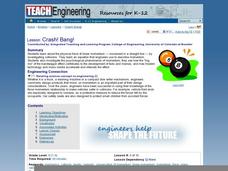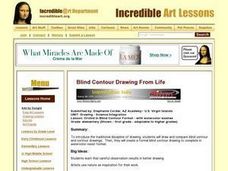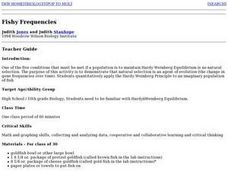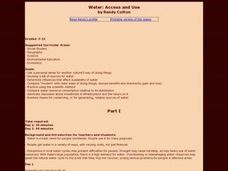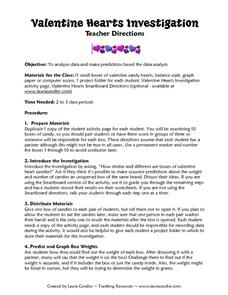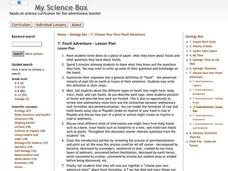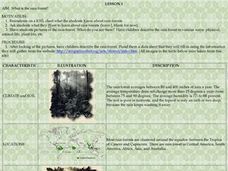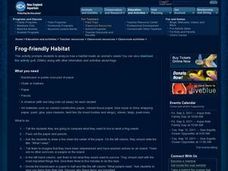Curated OER
Invertebrate Diversity
Students observe different animals with bilateral symmetry. In this biology lesson plan, students compare how these animals move. They discuss the evolutionary history of observed animals.
University of Arizona
Skittles & M&Ms Probability Experiment
Young scholars are introduced to the scientific method by hypothesizing, counting, analyzing and concluding which company packs candy more reliably - Skittles or M&Ms.
Curated OER
Epidemic, Plague, and Infection
Students recognize disease vectors (pathways) and risk factors for infectious diseases.
Curated OER
Jelly Bean Math
Young scholars estimate, measure, compute, and create patterns using jelly beans. In small groups, they solve various calculations, place jelly beans into groups, invent a new flavor, create a pattern, and complete a worksheet.
Curated OER
Disease Prevention and HIV/AIDS Education - Second Grade
Second graders, in groups, rotate to several stations around the room, in which question cards, regarding disease prevention, have be assigned. Groups visit each station, discuss and record their answer to the question and move to the...
Curated OER
Crash! Bang!
Young scholars study the physical force of linear momentum by investigating collisions. They analyze the difference between elastic and inelastic collisions. They calculate linear momentum.
Curated OER
Orchid in Blind Contour Format
Students create blind contour drawings. They compare methods of drawing including blind contour and contour approaches. Students follow a blind contour method to produce a drawing of a flower and then complete the piece with a watercolor...
Curated OER
Fishy Frequencies
Tenth graders demonstrate that natural selection is an agent of evolution. They quantitatively apply the Hardy-Weinberg Principle to an imaginary population of fish. They utilize math and graphing skills, collecting and analyzing data,...
Curated OER
Water: Access and Use
Students get a personal sense for another culture's way of doing things. Develop a list of sources for water. Practice using the scientific method. Examine means for conserving, or for generating, reliable sources of water.
Curated OER
Poison Play Scenarios
In this real-life scenario worksheet, students posing as campers act out six short scenarios that involve situations that campers may indeed find themselves in one day in the future.
Curated OER
Valentine Hearts Investigation
Students practice analyzing data and making predictions. For this 2nd - 3rd grade lesson plan, students investigate and compare data gathered using boxes of valentine candy hearts. Students examine the different boxes of candy...
Curated OER
Animal Bingo
Students discuss facts about animal habitats. In this animal lesson, students recall animal facts about habitats in an animal Bingo game. Teacher pieces and cards are already created and ready to print out.
Curated OER
What Are Erosion and Sediments?
Students create experiments in class based on the erosion of Earth. In this erosion lesson, students perform a lab in class replicating the effects of erosion. Students finally draw their own conclusions based on the research performed.
Curated OER
Microbes: Louis Pasteur - A Microbe Discoverer
Students study Louis Pasteur and the process of pasteurization in controlling microbes. In this pasteurization lesson, students discuss microorganisms and how they can affect health. They discuss Louis Pasteur and research his work by...
Curated OER
Fossil Adventure
Students create a book about the process of a dinosaur becoming a fossil. In this earth science instructional activity, students are taught about fossils and create a book that tells what happened to a dinosaur's bones after they die.
Curated OER
What is the Rainforest?
Learners investigate rainforests. In this rainforest lesson, students brainstorm on a KWL chart about what they already know about the rain forest. Learners are shown pictures of the rain forest and describe what they see in the photos....
Curated OER
Frog Friendly Habitat
Students create a frog friendly habitat. In this animal habitat lesson, students study what animals need to survive and then create a frog habitat from a shoe box. Students write a report about frogs and present their habitats to the class.
Curated OER
Cold and Flus
Students investigate the difference between viral and bacterial illnesses. For this health lesson, students learn the symptoms of each and examine ways to prevent spreading virusus and bacteria.
Curated OER
Apple Estimation: Percentages & Subjective Reasoning
Students practice using their estimation skills by utilizing apples. In this percentage lesson, students utilize a scale and an apple to discover the percentage of each bite they take. Students share their data with the rest of the...
Curated OER
It's Alive! Using Microorganisms in Cooking
Students create a KWL chart about food. In this chemistry lesson, students differentiate physical and chemical changes. They explain how microorganisms are used in food preparation.
Curated OER
Rhyming With Ramon
Pupils examine healthy behaviors to avoid the flu. They repeat words that rhyme, sing a song, and repeat a chant and act out the verses to reinforce healthy behaviors to avoid the flu.
Curated OER
Germs
First graders discuss as a class how many of them have sneezed today. They then listen as the teacher explains that germs come out of their nose during a sneeze or when they blow their nose. They then discuss other ways that a person...
Curated OER
Wanted: The Infamous Five
Young scholars name the five most common types of foodborne pathogens. They comprehend how bacteria can grow and spread. Students are taught healthy hygiene and food-safety habits. They discuss the crimes of the five most wanted...
Curated OER
BACTERIAL GROWTH ON FOOD
Students address the question of the value of refrigeration in keeping food (chicken) from "spoiling". They experiment with aseptic technique skills in handling sterile water and some type of quoting system.
Other popular searches
- Hygiene Washing Hands
- Nursing Plans Washing Hands
- Sequence of Washing Hands
- Process for Washing Hands
- Washing Hands Clip Art
- Washing Hands Lesson Plans







